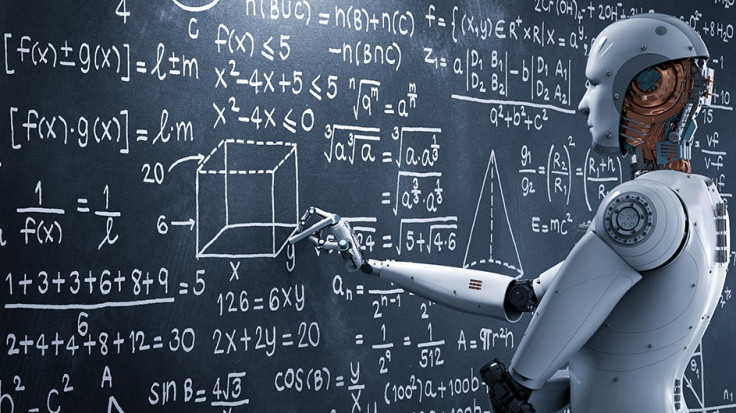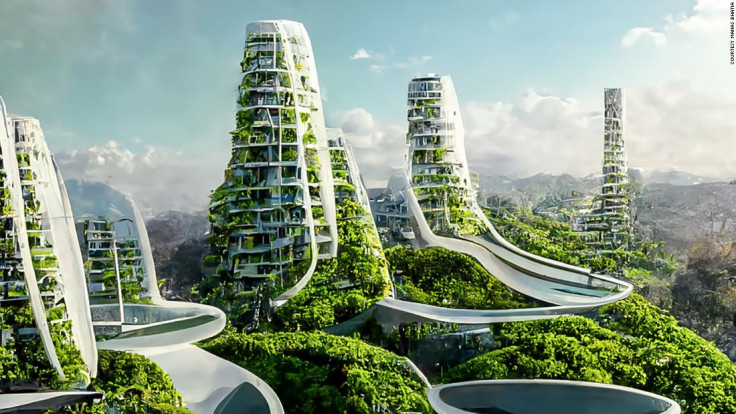Built-world AI is the present and the future
A report published by Europe's largest sustainable investor reveals that startups harnessing AI for the Built World are growing at a rapid pace.

AI is currently the word on everyone's lips right now. Unless you've been living under a rock for the past few years, you're bound to have read something about developments in the world of artificial intelligence.
Although AI is a field which has been the subject of scientific interest for many years, new advancements in AI technology have emerged in 2023, sparking both excitement and concern about the potential impact of machine-generated intelligence on the human race.
So then what is AI? A simple explanation would be AI is the ability of a machine to perform cognitive functions as humans do, such as perceiving, learning, reasoning and solving problems.
Every time you use a smart device or some sort of slick technology - be it a smartwatch, smart speaker, security alarm, or even customer service chat box - you're engaging with AI. Its potential uses range from advanced web search engines and recommendation systems to self-driving vehicles, generative or creative tools and automated decision-making systems.
In 2019, The World Intelligence Property Organisation reported that AI was the most prolific emerging technology in terms of the number of patent applications and market size.
The AI software market's global annual revenue is currently over $50 billion, and according to a study by ResearchandMarkets, this is expected to reach $301.2 billion by 2028, growing at 29.4 per cent CAGR (compound annual growth rate).
The study emphasises the particular development of AI technology such as Integration Expert Systems, Decision Support Systems, Fuzzy Systems, and Multi-Agent Systems.
One new AI programme, released at the end of November last year, has attracted significant attention - ChatGPT.
Owned and developed by the AI research and deployment company, OpenAI, ChatGPT is an artificial intelligence chatbot trained to follow instructions and provide a detailed response.
It can make an entire website layout for you, or write an easy-to-understand explanation of dark matter in a few seconds. ChatGPT can also be used for essay writing, relationship advice and mathematical problem-solving.
Speaking on the prowess of ChatGPT, Fei-Fei Li, Professor of Computer Science at Stanford University, said: "The service has the potential to revolutionise the way we interact with machines and make human-like conversations with AI."
According to the latest available data, ChatGPT currently has over 100 million users, and the website generates 1 billion visitors per month. This user and traffic growth was achieved in a record-breaking two-month period (from December 2022 to February 2023).
According to analysts in response to these figures, we have not witnessed faster growth in any consumer internet applications in the past 20 years.
While the artificial intelligence software has been lauded for its ability to instantly produce advanced text such as essays, poems and stories, it has also sparked concern about misinformation and data leaks, as well as its use by students for assessments and exams.
In an opinion piece written by Jonathan Turley and published by USA Today, a test was conducted on ChatGPT regarding cases of sexual harassment committed by professors.
To the shock and concern of the teacher behind the experiment, the bot relayed a false allegation of sexual harassment perpetrated by himself as a fact, citing a 2018 Washington Post article about the case.
Schools and universities have introduced new regulations banning the use of ChatGPT, as well as developing software that can detect its use. Students can now face suspension or expulsion if they are found guilty of plagiarising an assignment using the application.
Last month, Italy announced it was temporarily blocking ChatGPT over data privacy concerns, the first Western country to take such action against the popular artificial intelligence chatbot.
Fears over the rapid development of artificial intelligence systems even prompted billionaire Tesla and Twitter boss Elon Musk to join hundreds of experts in expressing concern at the advancement of powerful AI systems.
In a letter issued by the Future of Life Institute, the growing concerns of AI's advancement were expressed, stating: "They should be developed only once we are confident that their effects will be positive and their risks will be manageable."
The letter was in response to Microsoft-backed OpenAI's unveiling of the fourth iteration of its GPT (Generative Pre-trained Transformer) AI program.
In a company tweet at the beginning of the year, Microsoft CEO Satya Nadella announced a "multiyear, multibillion-dollar investment to accelerate AI breakthroughs" that would be "broadly shared with the world."
However, OpenAI is not the only company making serious advances in artificial intelligence software.
A new report published by Europe's largest sustainable VC investor, "A/O PropTech", reveals that startups harnessing AI for the built world are growing rapidly, with $12.3 billion raised in the last three years.
The report, which explores the adoption of AI technology in the built environment, claims investment in built-world tech reached $4.2 billion in 2022, a result of soaring global demand for AI-enabled startups deploying technologies for the built world.
AI for the built world encompasses anything from robotics used in construction, to computer vision and generative AI to create smart buildings and infrastructure and enable real estate investment.
Since the creation of AI technology, its use in fintech has proved the most popular and profitable. AI technologies can help fintech companies and institutions to keep in touch with their customers, automate customer support, improve fraud detection, and simplify the decision-making process with data and predictive analysis.
However, the past five years have seen the gradual maturation of AI startups in the built world. Series A+ deals have grown from around 20 per cent of deal flow to represent 50 per cent.
Meanwhile, Seed stage activity has remained broadly consistent, indicating further growth ahead.
As the report indicates, built-world AI has overtaken fintech, in both demand and investment.
For the first time, AI-enabled startups in the built world raised as much as the finTech sector in 2022, and in both 2021 and 2022, AI deals in the built world overtook the FinTech AI sector, reaching over 600 deals globally in 2021 alone.

The reason for this sudden surge in interest? Sustainability.
The built world accounts for 40 per cent of global GHG emissions, with 11 per cent of emissions stemming from construction materials (embodied carbon) alone. Bringing new technologies to retrofit older buildings is as critical as developing technology for new buildings to achieve a low-carbon, energy-efficient and greener economy for generations to come.
Last year, investment in built-World AI was largely concentrated on real estate transactions, smart building, and construction startups which found new solutions to sustainability and environmental issues.
For example, startup company Predium uses AI to provide companies with a platform sharing data on buildings, consumption, CO2 emissions, tenants, and climate risks - they received over $1.6 million of investment in 2022.
Deepki raised a $165 million Series C for its real estate decarbonisation platform, whilst Descartes Underwriting raised a $121 million Series B to scale up its parametric insurance offering.
And the trend is continuing this year.
There has already been significant investment in greening up construction with Carbonaide and Concretene.
Also receiving funding is Oculai, a software company which uses AI to gain greater insights into building sites (critical to reducing environmental inefficiencies), and Neverwaste (formerly called Unwasted), which turns waste cardboard and packaging into panel boards for use in construction, furniture, kitchens, and flooring.
Clearly, the environmental benefits of this new AI technology have captured the interest of investors.
Built world AI startups in Europe and North America alone received a total of $18.6 billion in venture capital funding, of which close to half was in the last two years ($8.6 billion), according to PropTech's research.
Gregory Dewerpe, founder and CIO of A/O PropTech is cautiously optimistic about the potential of new built-world artificial intelligence.
He said: "We are already seeing the adoption of generative AI applications across the entire lifecycle from design, architecture and construction to operations and management.
"However it is important to look at innovation in a holistic manner, and while AI has massive potential, it will require the entire tech stack of the built world to progress forward (data, transparency, automation) to yield game-changing impact."
According to Dewerpe, the key to unlocking "true automation" in the built world is "broadening digitisation." He believes this will enable innovators to leverage generative models and other AI technologies to be used for decarbonising our buildings and cities.
New research at the beginning of the year revealed that staying within the 1.5 degree Celsius limit was currently "not plausible," but that this could change if societies stepped up their efforts to cut emissions. Developments in built-world AI technology could prove vital to turning the tide in the fight against climate change.
So what now?
Despite concerns over the rapid rate of AI advancement, reports now suggest a more powerful GPT-5 will complete training by the end of the year. Tech entrepreneur and developer Siqi Chen tweeted that ChatGPT-5 is expected to achieve Artificial General Intelligence (AGI) by December.
Last week, Facebook owner Meta published an artificial intelligence model that can pick out individual objects from within an image, along with a dataset of image annotations that it said was the largest ever of its kind.
Chief Executive Mark Zuckerberg has said that incorporating such generative AI "creative aids" into Meta's apps is a priority this year.
Meanwhile, the Georg Nemetschek Institute of Artificial Intelligence for the built world at the Technical University of Munich (TUM GNI), established in 2020, has already funded six innovative research projects, all of which have begun their first stages of work.
They include Artificial Intelligence for Smart Design and Testing of Cement, and Concrete and Spatial AI for Cooperative Construction Robotics.
Much attention has been given to the dangers of developing artificial intelligence to levels not seen before, but we should not overlook the potential benefits of the technology either.
As Bill Gates once said, the development of AI is as fundamental as the creation of the microprocessor, the personal computer, the Internet, and the mobile phone.
According to the tech expert, it will change the way people work, learn, travel, get health care, and communicate with each other.
"Entire industries will reorient around it and businesses will distinguish themselves by how well they use it", Gates added.
There is no doubt that developments in built-world AI could have world-altering implications on health, education and science. While we must remain cautious, artificial intelligence should be embraced, not feared.
© Copyright IBTimes 2025. All rights reserved.






















